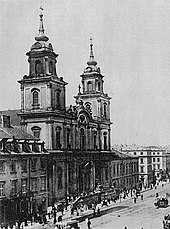Warsaw pogrom (1881)
| Part of a series on |
| Antisemitism |
|---|
 |
|
|
The Warsaw pogrom was a pogrom that took place in Russian-controlled Warsaw on 25–27 December 1881, then part of Congress Poland in the Russian Empire, resulting in two people dead and 24 injured.[1]
Warsaw pogrom

The mob began to attack Jews, Jewish stores, businesses, and residences in the streets adjoining the Holy Cross Church.[2] The riots in Warsaw continued for three days, until Russian authorities (who controlled the police as well as military in the city) intervened, arresting 2,600 people. During the Warsaw pogrom two people were left dead and 24 injured. The pogrom also left about a thousand Jewish families financially devastated. In the months afterwards, about a thousand Warsaw Jews emigrated to the United States.[3] The pogrom worsened Polish-Jewish relations, and was criticized by such members of the Polish elite as writers Eliza Orzeszkowa, Boleslaw Prus and several other notable activists.[3][4]

Historians
References
- ISBN 83-04-04381-5. Retrieved 5 May 2015.
- ISBN 1-886223-11-4, p. 342
- ^ ISBN 0-19-513146-0, p.162
- ^ ISBN 0-521-52851-8, p.182
- ^ (in Polish) Pogrom Archived 2010-02-06 at the Wayback Machine, based on Alina Cała, Hanna Węgrzynek, Gabriela Zalewska, "Historia i kultura Żydów polskich. Słownik", WSiP
- ^ (in Polish) Magdalena Micinska, INTELIGENCJA ŻYDOWSKA W POLSCE, 2002
- Odessa, and in seeing that the "cultured Pole" should not fall behind the Russian in order to convince Europe that pogroms were not exclusively a Russian manufacture." See Klier and Lambroza for more details.
